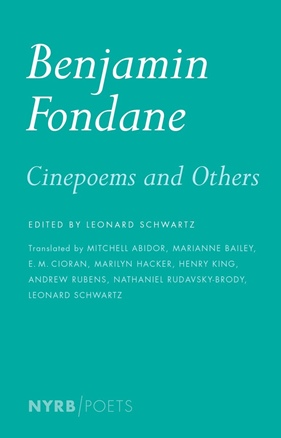Description
Benjamin Fondane was that rarest of poets: an experimental formalist with a powerful lyric poetic voice; a renegade surrealist who was also a highly original existential philosopher; a self-consciously Jewish poet of diaspora and loss, whose last manuscripts made it out of Drancy in 1944 just before his deportation to Auschwitz-Birkenau, where he was murdered, yet whose poetry speaks of an overflowing plenitude. This bilingual selection is the first volume of Fondane’s poetry to appear in English, and it includes a broad sample of his work, from the coruscating and comic cinepoems of his surrealist years, to philosophical meditations, to poems that in their secular and mystical Judaism confront the historical calamity—and imaginative triumph—of European Jewry.
About the Author
alt spelling:Benjamin FundoianuBenjamin Fondane or Benjamin Fundoianu; born Benjamin Wechsler, Wexler or Vecsler, first name also Beniamin or Barbu, usually abridged to B.; was a Romanian and French poet, critic and existentialist philosopher, also noted for his work in film and theater. Known from his Romanian youth as a Symbolist poet and columnist, he alternated Neoromantic and Expressionist themes with echoes from Tudor Arghezi, and dedicated several poetic cycles to the rural life of his native Moldavia. Fondane, who was of Jewish Romanian extraction and a nephew of Jewish intellectuals Elias and Moses Schwartzfeld, participated in both minority secular Jewish culture and mainstream Romanian culture. During and after World War I, he was active as a cultural critic, avant-garde promoter and, with his brother-in-law Armand Pascal, manager of the theatrical troupe Insula.Fondane began a second career in 1923, when he moved to Paris. Affiliated with Surrealism, but strongly opposed to its communist leanings, he moved on to become a figure in Jewish existentialism and a leading disciple of Lev Shestov. His critique of political dogma, rejection of rationalism, expectation of historical catastrophe and belief in the soteriological force of literature were outlined in his celebrated essays on Charles Baudelaire and Arthur Rimbaud, as well as in his final works of poetry. His literary and philosophical activities helped him build close relationships with other intellectuals: Shestov, Emil Cioran, David Gascoyne, Jacques Maritain, Victoria Ocampo, Ilarie Voronca etc. In parallel, Fondane also had a career in cinema: a film critic and a screenwriter for Paramount Pictures, he later worked on Rapt with Dimitri Kirsanoff, and directed the since-lost film Tararira in Argentina.A prisoner of war during the fall of France, Fondane was released and spent the occupation years in clandestinity. He was eventually captured and handed to Nazi German authorities, who deported him to Auschwitz-Birkenau. He was sent to the gas chamber during the last wave of the Holocaust. His work was largely rediscovered later in the 20th century, when it became the subject of scholarly research and public curiosity in both France and Romania. In the latter country, this revival of interest also sparked a controversy over copyright issues.
